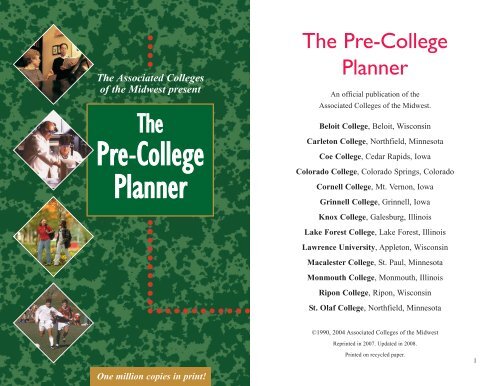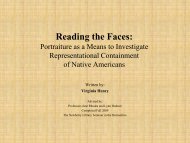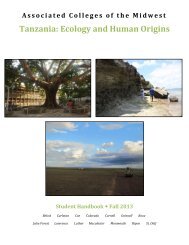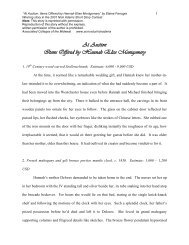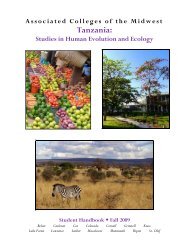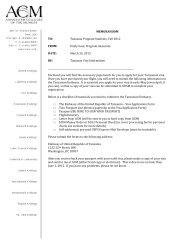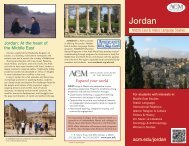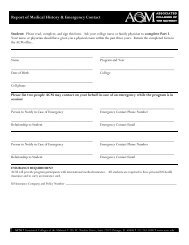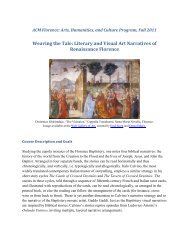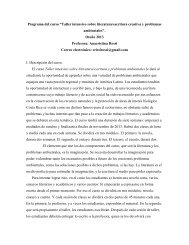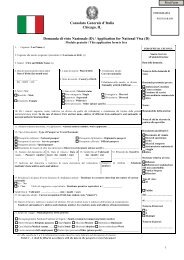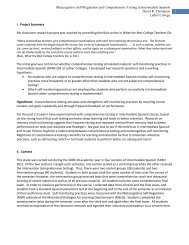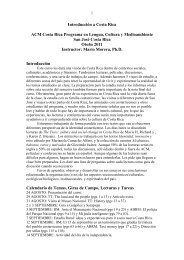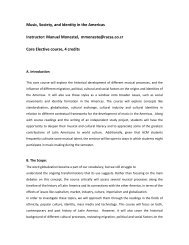Pre-College Planner - Associated Colleges of the Midwest
Pre-College Planner - Associated Colleges of the Midwest
Pre-College Planner - Associated Colleges of the Midwest
- No tags were found...
You also want an ePaper? Increase the reach of your titles
YUMPU automatically turns print PDFs into web optimized ePapers that Google loves.
The <strong>Associated</strong> <strong>College</strong>s<strong>of</strong> <strong>the</strong> <strong>Midwest</strong> presentThe<strong>Pre</strong>-<strong>College</strong><strong>Planner</strong>The <strong>Pre</strong>-<strong>College</strong><strong>Planner</strong>An <strong>of</strong>ficial publication <strong>of</strong> <strong>the</strong><strong>Associated</strong> <strong>College</strong>s <strong>of</strong> <strong>the</strong> <strong>Midwest</strong>.Beloit <strong>College</strong>, Beloit, WisconsinCarleton <strong>College</strong>, Northfield, MinnesotaCoe <strong>College</strong>, Cedar Rapids, IowaColorado <strong>College</strong>, Colorado Springs, ColoradoCornell <strong>College</strong>, Mt. Vernon, IowaGrinnell <strong>College</strong>, Grinnell, IowaKnox <strong>College</strong>, Galesburg, IllinoisLake Forest <strong>College</strong>, Lake Forest, IllinoisLawrence University, Appleton, WisconsinMacalester <strong>College</strong>, St. Paul, MinnesotaMonmouth <strong>College</strong>, Monmouth, IllinoisRipon <strong>College</strong>, Ripon, WisconsinSt. Olaf <strong>College</strong>, Northfield, Minnesota©1990, 2004 <strong>Associated</strong> <strong>College</strong>s <strong>of</strong> <strong>the</strong> <strong>Midwest</strong>Reprinted in 2007. Updated in 2008.Printed on recycled paper.1One million copies in print!
Table <strong>of</strong> contents<strong>Pre</strong>-<strong>College</strong><strong>Planner</strong> ©1990,2004 <strong>Associated</strong><strong>College</strong>s <strong>of</strong> <strong>the</strong><strong>Midwest</strong>.2Self-assessment . . . . . . . . . . . . . . . . .4What are your interests and talents? What do you wantfrom your college education? What factors are importantto you in selecting a college?What colleges look forin prospective students . . . . . . . . . .9High school courses and grades, standardized tests,activities, recommendations, and <strong>the</strong> essay.Finding colleges thatmatch your goals . . . . . . . . . . . . . .13Making a list <strong>of</strong> colleges you’re interested in, talking topeople, using college guides and Web sites, college fairs,requesting information, and getting organized.Campus visits . . . . . . . . . . . . . . . . .19Planning your visits in advance, what to do when you’reon a campus, questions to ask, <strong>the</strong> interview, and whatto do after <strong>the</strong> visit.<strong>College</strong> evaluation chart . . . . . . . .24What’s your evaluation <strong>of</strong> <strong>the</strong> colleges you’veinvestigated?Financial assistance . . . . . . . . . . . . .26Types <strong>of</strong> financial assistance, financial aid forms, andresources for more information.Application countdown . . . . . . . . .29Application options, a checklist to use when you applyto colleges, and <strong>the</strong> national reply date.For more pre-college planninginformation and links, visit <strong>the</strong>ACM Web site: www.acm.eduThousands <strong>of</strong> colleges ...and lots <strong>of</strong> options for youto considerIf you are like many people considering college,you might already have one in mind that you want toattend. Maybe it’s a college or university that someonein your family went to, or one that a friend <strong>of</strong> yoursattends. Perhaps <strong>the</strong> college is in your hometown, oryou’re a fan <strong>of</strong> its sports teams.These are strong influences, and should not beignored. On <strong>the</strong> o<strong>the</strong>r hand, such early impressionsmight make you think that it’s <strong>the</strong> perfect college foryou. This probably isn’t true.There are about 3,500 colleges and universitiesin <strong>the</strong> United States — and, like <strong>the</strong> students whoattend <strong>the</strong>m, <strong>the</strong>y’re all different. They are privateand public, large and small, located in cities andsmall towns. Some are church-related, o<strong>the</strong>rs arenot. Some <strong>of</strong>fer <strong>the</strong> liberal arts and sciences, whileo<strong>the</strong>rs are specialized or technical.As you look at colleges, you will have to askyourself how important <strong>the</strong>se factors are to you. Butyour choice <strong>of</strong> a college should not be dictated by ashort visit or a casual comment.Understanding that <strong>the</strong>re’s no perfect college foryou also will make <strong>the</strong> application process moreexciting. If you narrow your sights to only one college,you may spend too much time worrying about gainingadmission to that particular school. That will keep youfrom seriously considering o<strong>the</strong>r colleges anduniversities.We urge you to look at a variety <strong>of</strong> options, andyou’ll quickly find that each one has its ownadvantages.3
Interest and talent inventoryAnswer <strong>the</strong> following questions in <strong>the</strong> space provided or on a separatepiece <strong>of</strong> paper.1. What subjects in school do you like best? List <strong>the</strong>m, along with <strong>the</strong> talentsor aptitudes used in <strong>the</strong>se courses.SubjectTalents/aptitudes involvedExample: artcreativity, expressiveness<strong>Pre</strong>-<strong>College</strong><strong>Planner</strong> ©1990,2004 <strong>Associated</strong><strong>College</strong>s <strong>of</strong> <strong>the</strong><strong>Midwest</strong>.Self-assessment“Where are you going to college?”If you haven’t heard that question already,you probably will soon. Where do you begin t<strong>of</strong>ind <strong>the</strong> college that’s right for you?When <strong>the</strong> ancient Greeks had questions<strong>the</strong>y couldn’t answer, <strong>the</strong>y consulted <strong>the</strong> famousoracle at Delphi, a village in central Greece.Inscribed on <strong>the</strong> temple <strong>of</strong> Apollo was <strong>the</strong>saying: “Know thyself.”To choose a college, you don’t have toconsult an oracle. But you do have to knowsomething about yourself — your interests andabilities, dreams and goals, and reasons for attendingcollege.Take some time to think about what your goals arefor your education and your life. This self-knowledgewill help you decide what to look for and whichquestions to ask as you investigate colleges. Later on, itwill help you sort out which colleges and universitieshave <strong>the</strong> programs, facilities and atmosphere that willbe best for you.2. List three achievements in your life <strong>of</strong> which you are most proud. Whattalents or abilities led to <strong>the</strong>se achievements?AchievementTalents/abilities involvedExample: winningability to contruct and presentdebate contestpersuasive arguments3. What are your hobbies or interests outside <strong>of</strong> school? What talents or skillsare used in <strong>the</strong>m?Hobbies/interestsTalents/skills involved4. Sometimes we’re not aware <strong>of</strong> all our strengths and talents. Ask a closefriend or teacher to list three things he or she thinks you do especially well.It doesn’t have to be something specific like playing football or <strong>the</strong> Frenchhorn — talents like being a good listener or a good leader in a group can belisted. Compare <strong>the</strong>ir answers with your lists in questions 1, 2 and 3.45
As you consider colleges, keep in mind <strong>the</strong>academic subjects and extracurricular activities that youdo well in and enjoy <strong>the</strong> most. Your interest in <strong>the</strong>mprobably will continue in college, and you can explore<strong>the</strong>m in more depth. However, remember that you’ll beable to try new subjects and activities, too.In deciding what kind <strong>of</strong> education best meets yourneeds, one choice you’ll make is between a liberal artseducation and a more specialized education.Liberal arts and sciences?A liberal arts and sciences education isbroad. You’ll study literature, languages, and<strong>the</strong> natural and social sciences. There alsomight be options to study computer scienceand business, to set up a career internship, andto study abroad for a term.Studies have shown that a liberal artseducation makes you a careful reasoner and acreative and flexible thinker. You’ll learn tospeak and write persuasively and to solve complexproblems. All <strong>of</strong> <strong>the</strong>se are qualities that employers andgraduate programs value.A liberal arts education will help you understand<strong>the</strong> world around you and develop your interests, talentsand values. If you enjoy a variety <strong>of</strong> subjects and thinkyou could succeed in a number <strong>of</strong> areas, <strong>the</strong>n youprobably should consider <strong>the</strong> liberal arts and sciences.Or specialized education?Small or large?You’ll quickly discover in your search that collegesrange in size from a few hundred students to 30,000 ormore — <strong>the</strong> size <strong>of</strong> a small city! What size is right foryou?At a smaller-sized college or university, you mightenjoy more personal attention and better access toequipment and facilities. You may find it easier to getinvolved in activities outside <strong>of</strong> class. Also, you’dprobably have more contact with faculty, and be morelikely to get into <strong>the</strong> courses you want to take.Large state schools usually <strong>of</strong>fer many courses ina wide variety <strong>of</strong> fields, with specialties such asadvertising or forestry. Class sizes probably will belarger, especially for lecture courses. Facilities andequipment are likely to be extensive, but used by manypeople.What about cost?<strong>College</strong> costs have risen sharply in recent years, atpublic and private schools alike. But before you cross acollege <strong>of</strong>f your list because <strong>of</strong> its price tag, find outwhat financial assistance might be available.Many colleges and universities that charge a lot alsoprovide substantial financial aid. With <strong>the</strong> aid, you mayfind that it costs you no more to attend a higher-pricedschool than one that appears to cost less.Don’t let initial costs alone determine your future.The extra cost <strong>of</strong> attending one school ra<strong>the</strong>r thanano<strong>the</strong>r is small when you divide it by <strong>the</strong> number <strong>of</strong>years this education must serve you. (More on financialassistance later.)“Before youcross acollege <strong>of</strong>fyour listbecause <strong>of</strong>its price tag,find out whatfinancialassistancemight beavailable.”Specialized education will train you for a specificjob or career. Perhaps you’d like to be a commercialartist or photographer, an interior designer or a licensed<strong>Pre</strong>-<strong>College</strong>practical nurse. Maybe your interests are in construction<strong>Planner</strong> ©1990,2004 <strong>Associated</strong> technology or agriculture.O<strong>the</strong>r factors<strong>College</strong>s <strong>of</strong> <strong>the</strong>For fields like <strong>the</strong>se that require technical expertise,1. In what clubs, activities and sports would you like<strong>Midwest</strong>.you should consider specialized education. You’ll findto participate?that it is most commonly <strong>of</strong>fered at a large university,2. Do you seek opportunities for international study?community college or technical institute.6 7
3. Is <strong>the</strong> college’s distance from your home importantto you? How close or far away would you like it tobe?4. Are you looking for a particular type <strong>of</strong> climate orscenery? Do you want access to outdoor recreation?5. Is diversity <strong>of</strong> students important to you? Would youlike to go to school with people from o<strong>the</strong>r parts <strong>of</strong><strong>the</strong> United States and from o<strong>the</strong>r countries?6. Would you prefer a residential college, where moststudents live on campus and take part in collegeactivities on <strong>the</strong> weekends? Would you prefer acommuter campus?7. Is <strong>the</strong> size <strong>of</strong> <strong>the</strong> town or city in which <strong>the</strong> college islocated important to you?8. Do you want to attend a college with a religiousaffiliation?What collegeslook for inprospectivestudents<strong>Pre</strong>-<strong>College</strong><strong>Planner</strong> ©1990,2004 <strong>Associated</strong><strong>College</strong>s <strong>of</strong> <strong>the</strong><strong>Midwest</strong>.The students set <strong>the</strong> tone and atmosphere <strong>of</strong>a college or university. Knowing that, admission<strong>of</strong>ficers try to fill <strong>the</strong> first-year class withinteresting, creative and sensitive young people.Most college representatives are eager tomatch you with <strong>the</strong>ir college only if you’ll enjoyit and are likely to do well <strong>the</strong>re. A mismatch,while sometimes unavoidable, can be costly forboth <strong>the</strong> student and <strong>the</strong> college.Thus pr<strong>of</strong>essional admission representatives willtry to give you accurate and complete information.They’ll be open about <strong>the</strong> strengths and weaknesses <strong>of</strong><strong>the</strong>ir colleges. They’ll help you work your way through<strong>the</strong> admission process and might suggest o<strong>the</strong>r collegesfor you to explore.To decide whe<strong>the</strong>r you and a college will fit welltoge<strong>the</strong>r, admission counselors look at a number <strong>of</strong>factors.8 9
Courses and grades in highschool are most importantYour high school record probably will be <strong>the</strong> mostimportant factor in whe<strong>the</strong>r you’ll be admitted to aparticular college or university. Good grades in all yourcourses throughout high school show that you’re willingto work hard and have an interest in a variety <strong>of</strong> subjects.A poor grade or two in high school does notnecessarily mean you won’t be admitted to aselective college. If your grades improve, even latein your high school career, most colleges willnotice.<strong>College</strong>s also consider <strong>the</strong> diversity anddifficulty <strong>of</strong> <strong>the</strong> courses you’ve taken. Success in<strong>the</strong> tougher courses (honors, accelerated,International Baccalaureate or AdvancedPlacement) suggests you’ll do well in college.Most colleges prefer that students take fouryears <strong>of</strong> English, three or more years <strong>of</strong> ma<strong>the</strong>matics,science and social science, and at least two years <strong>of</strong> aforeign language. <strong>College</strong>s that are more selective maybe looking for a more demanding high school schedule.However, admission representatives will take intoaccount what your school <strong>of</strong>fers.Scores on standardized testsare in a range extending below, as well as above, thataverage. An increasing number <strong>of</strong> colleges list a rangethat shows <strong>the</strong> scores <strong>of</strong> <strong>the</strong> middle 50 percent <strong>of</strong> <strong>the</strong>students who attend <strong>the</strong> school.<strong>College</strong> admission <strong>of</strong>ficers are fully aware, too, thatsome students don’t “test well.” Slow reading speed,unfamiliarity with <strong>the</strong> test format or simple fear maycause a student to perform poorly on standardized tests.For <strong>the</strong>se reasons, virtually all colleges alsoconsider o<strong>the</strong>r factors when <strong>the</strong>y select students. Theylook at grades, class rank, recommendations, essaysand a student’s special talents and achievements.Activities outside <strong>the</strong> classroomMost colleges, and liberal arts colleges especially,look for students with many interests. <strong>College</strong>s noticestudents involved in <strong>the</strong>ater, musical groups, specialinterest clubs (such as photography or debate), studentpublications, sports or student government. Communityservice and church activities are important to manycolleges, as well.Of course, colleges also look for students whobelong to academic groups, such as honor societies,language clubs and science clubs.Part-time work, interesting summer adventures orunusual experiences may also be <strong>of</strong> interest to somecolleges.“Mostcolleges,and liberalarts collegesespecially,look forstudentswith manyinterests.”The widely-used tests are <strong>the</strong> SAT I and <strong>the</strong> ACT.Usually, <strong>the</strong>se tests are taken during <strong>the</strong> junior andRecommendationssenior years. To gain experience, many students take<strong>College</strong>s differ when it comes to recommendations.<strong>the</strong> <strong>Pre</strong>liminary SAT (PSAT) or <strong>the</strong> PLAN in <strong>the</strong>irMost require a recommendation from your high schoolsophomore year. The PSAT is required to qualify for aguidance counselor. Some also ask for academicNational Merit Scholarship.references from teachers and/or a personal referenceHow important are your test scores? That dependsfrom an adult you know well, such as a friend <strong>of</strong> <strong>the</strong><strong>Pre</strong>-<strong>College</strong>on where you apply. Most colleges require <strong>the</strong>m,<strong>Planner</strong> ©1990,family, an employer or a member <strong>of</strong> <strong>the</strong> clergy.2004 <strong>Associated</strong> although some put less emphasis on <strong>the</strong> tests.It is important that <strong>the</strong>se people know you well<strong>College</strong>s <strong>of</strong> <strong>the</strong><strong>College</strong> guidebooks and admission materials <strong>of</strong>tenenough to provide valuable insights about you. They’ll<strong>Midwest</strong>.list <strong>the</strong> average test scores <strong>of</strong> students at a college orbe asked about your intellectual strengths, youruniversity. Keep in mind that this is an average, not apersonality and what you do outside <strong>of</strong> class.10minimum. The scores <strong>of</strong> students admitted to <strong>the</strong> school11
“The essayis yourchance topersonalizeyourapplication.”<strong>Pre</strong>-<strong>College</strong><strong>Planner</strong> ©1990,2004 <strong>Associated</strong><strong>College</strong>s <strong>of</strong> <strong>the</strong><strong>Midwest</strong>.Too <strong>of</strong>ten, nei<strong>the</strong>r <strong>the</strong> counselor nor a teacherknows a student well enough to accurately assess his orher potential. We suggest you spend time with yourguidance counselor and make an effort to know one ortwo teachers well.The essayMany colleges require an essay as part <strong>of</strong> <strong>the</strong>application. This can be an intimidating task. Here aresome points to keep in mind as you approach <strong>the</strong> essay.• The essay is your chance to personalize yourapplication and to express yourself in a way that youcannot in <strong>the</strong> rest <strong>of</strong> <strong>the</strong> application.• Admission <strong>of</strong>ficers are not looking for a particular“correct answer” on <strong>the</strong> essay. They want to find outwhat you are like as an individual.• The essay is a demonstration <strong>of</strong> your writing ability,which is a key component <strong>of</strong> success in college. Besure to use <strong>the</strong> principles <strong>of</strong> good writing, such asdeveloping a logical structure for your essay, checkingyour grammar and pro<strong>of</strong>reading carefully.Finding collegesthat matchyour goalsDoes <strong>the</strong> process <strong>of</strong> finding out about collegesand applying seem difficult, and even a bitfrightening? If so, you’re not alone. Many studentsfeel that way, at least sometimes.Actually, choosing a college should be part <strong>of</strong>an exciting search for your future. What you learn atcollege and <strong>the</strong> experiences you have <strong>the</strong>re will be apart <strong>of</strong> you always.If you’re excited about choosing a college, <strong>the</strong>admission process will be more interesting. Also, yourenthusiasm will show up in your application essays andinterviews.Through <strong>the</strong> self-assessment, you’ve started tonarrow down <strong>the</strong> kind <strong>of</strong> education and college youwant. Now you can begin to select <strong>the</strong> schools thatmeet your requirements. You may have a list already.To expand it, turn to <strong>the</strong> sources listed on <strong>the</strong> followingpage.12 13
<strong>Pre</strong>-<strong>College</strong><strong>Planner</strong> ©1990,2004 <strong>Associated</strong><strong>College</strong>s <strong>of</strong> <strong>the</strong><strong>Midwest</strong>.Counselor and teachersCheck with your high school counselor forinformation and advice about colleges. The counseling<strong>of</strong>fice might have a computer data base <strong>of</strong> colleges orbe able to help you use <strong>the</strong> Internet to ga<strong>the</strong>r currentinformation about colleges. Your teachers also might beable to suggest colleges for you to explore.Standardized testsParentsYour counselor can tell you when <strong>the</strong>standardized tests will be given in your area.If you mark <strong>the</strong> appropriate box when youregister for <strong>the</strong> PSAT, SAT, PLAN or ACT,you’ll probably get brochures and letters froma lot <strong>of</strong> colleges and universities. Look overthis material and discuss it with your parents,friends and counselors.Often, <strong>the</strong> most successful college choices are madewhen students and parents work as a team to exploreoptions.Your friendsThey may know <strong>of</strong> some colleges that are unfamiliarto you. Maybe <strong>the</strong>y have bro<strong>the</strong>rs or sisters in collegeto whom you could talk. Remember, though, that whatyou and your family look for in a college may be verydifferent from what your friends want.<strong>College</strong> guidesThere are many fine guidebooks to colleges anduniversities, such as those listed on <strong>the</strong> following page.They are available at your school’s guidance <strong>of</strong>fice,high school or public library, or at a bookstore.These books are good sources for objectiveinformation about enrollment, major fields <strong>of</strong> study,church affiliation, costs and student life.Be wary <strong>of</strong> any guide that claims to rank collegesand universities. The quality <strong>of</strong> your educationalexperience will depend more on how well <strong>the</strong> collegemeets your needs and goals than on any criteria aguide might use to rank colleges.Also, no one guide can capture <strong>the</strong> spirit or strength<strong>of</strong> a college. If you compare several accounts, though,you can better judge a college’s admission literature.Barron’s Pr<strong>of</strong>iles <strong>of</strong> American <strong>College</strong>s<strong>College</strong> Division <strong>of</strong> Barron’s Educational SeriesThe <strong>College</strong> HandbookThe <strong>College</strong> BoardPeterson’s Four-Year <strong>College</strong>sPeterson’s, a division <strong>of</strong> Thomson Learning, Inc.Online resourcesThe following sites can help you search forcolleges on <strong>the</strong> Web.www.studentaid.ed.gov Check under <strong>the</strong> “Choosing”tab and <strong>the</strong>n “<strong>College</strong> Selection” for <strong>the</strong> <strong>College</strong> Finderto search for colleges and universities that match yourcriteria. This site, provided by <strong>the</strong> U.S. Department <strong>of</strong>Education, has a Spanish language version.www.nacacnet.org Look in <strong>the</strong> “Student Resources”section for a link to <strong>the</strong> Steps to <strong>College</strong> onlinenewsletter. This site is sponsored by <strong>the</strong> NationalAssociation for <strong>College</strong> Admission Counseling.www.collegeboard.com A college search feature onthis site uses information on colleges from The <strong>College</strong>Handbook.www.petersons.com Information from Peterson’scollege guides are used on this site to help you searchfor colleges.“No oneguide cancapture <strong>the</strong>spirit orstrength <strong>of</strong>a college.”14 15
<strong>Pre</strong>-<strong>College</strong><strong>Planner</strong> ©1990,2004 <strong>Associated</strong><strong>College</strong>s <strong>of</strong> <strong>the</strong><strong>Midwest</strong>.<strong>College</strong> Web sitesYou can get lots <strong>of</strong> information online from <strong>the</strong>Web sites <strong>of</strong> individual colleges and universities. Thesites will have facts and figures about <strong>the</strong> colleges,details about admission requirements and, in manycases, online applications and virtual campus tours.Web pages for a college’s academic departmentsusually include course listings and faculty biographies.Pr<strong>of</strong>essors <strong>of</strong>ten set up home pages for <strong>the</strong>ir courses,which can give you a sense <strong>of</strong> what classes at <strong>the</strong>college are like.There will also be pages about studentclubs and activities, a calendar <strong>of</strong> campusevents and, perhaps, <strong>the</strong> student newspaper.Browse through <strong>the</strong> students’ home pages to seea range <strong>of</strong> <strong>the</strong>ir interests and opinions.<strong>College</strong> admissionrepresentativesAdmission representatives from colleges anduniversities may visit your high school during <strong>the</strong>school year. Check with <strong>the</strong> guidance or collegecounseling <strong>of</strong>fice for a schedule <strong>of</strong> those visits.Be sure to seek out representatives from <strong>the</strong>colleges that interest you. This is a good opportunity tohave your questions answered.<strong>College</strong> fairsYour counselor can tell you about “college fairs” or“college nights” in your area. At <strong>the</strong>se events, admissionrepresentatives from many colleges ga<strong>the</strong>r in one placeto talk to high school students and <strong>the</strong>ir parents.Request informationfrom collegesAs you compile a list <strong>of</strong> colleges and universitiesyou might be interested in, contact <strong>the</strong>m forinformation. You can find <strong>the</strong> addresses, toll-freetelephone numbers and Web site addresses in <strong>the</strong>college guidebooks, at your high school’s guidance<strong>of</strong>fice or library, or through <strong>the</strong> online resources listedon page 15.Whe<strong>the</strong>r you call, write or e-mail, first think aboutwhat information you would like to request. Forexample, are <strong>the</strong>re majors, sports or activities that youwant to find out about? If so, be sure to ask about <strong>the</strong>m.Get organizedTo make <strong>the</strong> best use <strong>of</strong> all <strong>the</strong> information youga<strong>the</strong>r from colleges, get organized! One good way isto keep a folder for each college, along with a notebookwith several pages for each college.As <strong>the</strong> materials arrive or as you browse colleges’Web sites, read carefully with a pencil at hand. Note<strong>the</strong> things you like about a college and <strong>the</strong> things youdislike.How does <strong>the</strong> college compare with <strong>the</strong> factors youconsidered earlier (pages 6-8)? Jot down any questionsyou have as you read, and ask yourself <strong>the</strong>se questionsas well:1. Does <strong>the</strong> college have <strong>the</strong> major(s) or program(s)I want?2. Does it have <strong>the</strong> activities and/or sports I want?3. How likely am I to meet <strong>the</strong> college’s admissionrequirements?4. Will <strong>the</strong> college help me achieve my educationaland personal goals?The idea is not to make a final decision now.Instead, read and think about each college as carefullyas possible. Then figure out what o<strong>the</strong>r information youneed to ga<strong>the</strong>r.16 17
<strong>Pre</strong>-<strong>College</strong><strong>Planner</strong> ©1990,2004 <strong>Associated</strong><strong>College</strong>s <strong>of</strong> <strong>the</strong><strong>Midwest</strong>.18<strong>College</strong> nameName(s) <strong>of</strong> representative(s)(List dates <strong>of</strong> <strong>the</strong> following)High school visit<strong>College</strong> fair/nightInformation requestedInformation receivedO<strong>the</strong>rCommentsThere’s a lot to keep track <strong>of</strong>, so keep goodrecords throughout <strong>the</strong> college selection process.Here are some suggestions.• When you meet an admission representative, ask forhis or her business card and keep it with your files.• Whe<strong>the</strong>r you talk with a college representative inperson or on <strong>the</strong> phone, jot down <strong>the</strong> person’s name,<strong>the</strong> date and what you talked about.• Keep copies <strong>of</strong> your test score reports and <strong>of</strong> allforms, applications and letters you send out.• Write down <strong>the</strong> dates when you give recommendationand o<strong>the</strong>r forms to your teachers or counselor.For each college you investigate, you might wantto fill out a chart like <strong>the</strong> one below.Campus visitsNo publication, no matter how thorough, can giveyou a complete picture <strong>of</strong> a college or university. Acampus visit is <strong>the</strong> best way to see for yourself what acollege is like.Advance planning with <strong>the</strong> college’s admission<strong>of</strong>fice is important to help you make <strong>the</strong> most <strong>of</strong>your visit. Most colleges encourage campus visits,and many have special brochures and pages on <strong>the</strong>irWeb sites to help you plan one.When you’ve decided to visit a campus, contact<strong>the</strong> admission <strong>of</strong>fice. Tell <strong>the</strong>m <strong>the</strong> date you’d like tocome and <strong>the</strong> approximate time you expect to arrive.If you want to stay overnight in a residence hall, askif <strong>the</strong>y can make arrangements. They might also be ableto plan for you to talk with someone in one <strong>of</strong> yourinterest areas, such as a pr<strong>of</strong>essor, coach or director <strong>of</strong> amusical group.During your visit, try to meet with someone from<strong>the</strong> admission <strong>of</strong>fice or attend an information session.Take a tour <strong>of</strong> <strong>the</strong> campus, talk to students, have a mealin <strong>the</strong> cafeteria (many colleges will treat you), and pickup copies <strong>of</strong> <strong>the</strong> student newspaper and alumnimagazine. Some colleges also can arrange for you to sitin on a class.People’s views about a college or university canvary widely, so try to talk to as many people as possible.Whe<strong>the</strong>r your visit lasts an hour or a day, you shouldget all your questions answered. You already may havethought <strong>of</strong> a lot <strong>of</strong> questions. Here are some you mightwant to add to your list. In any case, be sure to ask <strong>the</strong>questions that are important to YOU.19
“Am Iintellectuallychallengedby what istaking placein <strong>the</strong>class?”When you talk to students, ask . . .1. How many hours a day do you study? Is that typical<strong>of</strong> students here?2. Are campus jobs readily available?3. Are faculty members interested in students andaccessible outside <strong>of</strong> class?4. Do many students go home on weekends?5. Is it easy to get involved in student activities?6. Are <strong>the</strong> athletic facilities open to all students or onlyto athletes?7. Is <strong>the</strong> food good?8. Is it possible to study in your dorm room?9. What’s <strong>the</strong> library like as a place to study? ... to doresearch?10. Do you feel challenged academically?11. What do you like most about this college? ... least?12. How easy is it to get <strong>the</strong> classes you want atregistration?13. If you had it to do again, would you still choose thiscollege?As you tour <strong>the</strong> campus, askyourself . . .1. Are <strong>the</strong> buildings in good repair?2. Are <strong>the</strong>re new buildings as well as older ones?3. Are <strong>the</strong> computers and lab equipment up-to-dateand plentiful?4. Are <strong>the</strong>re good facilities for <strong>the</strong> activities in whichI’m interested?5. Are rooms in residence halls pleasant? ... quietenough to study in?6. Are common areas in <strong>the</strong> residence hallsattractive? Are <strong>the</strong>re laundry and kitchenfacilities?7. What’s <strong>the</strong> cafeteria like?8. Are <strong>the</strong> grounds well-kept?9. Is <strong>the</strong> setting and architecture appealing?10. What’s <strong>the</strong> surrounding town or city like? Would Ifeel comfortable here?The interviewSome colleges require an interview, though manyIf you attend a class, askdo not. If <strong>the</strong> college requires or recommends one, seeyourself . . .if you can schedule it during your campus visit.As with any interview, be on time. If you know you’ll1. Are students interested in <strong>the</strong> material?be delayed, call ahead. Also, review <strong>the</strong> information2. Is <strong>the</strong>re time for questions and discussion? Doand notes you have on <strong>the</strong> college and prepare a list <strong>of</strong>students participate?questions ahead <strong>of</strong> time. Take <strong>the</strong> list along, so you’re3. Are students prepared for <strong>the</strong> class?sure to cover everything you wanted to find out.4. Am I intellectually challenged by what is takingIn your interview, you’ll probably be asked aboutplace in <strong>the</strong> class?your academic background, interests, hobbies, goals<strong>Pre</strong>-<strong>College</strong>and why you’re interested in <strong>the</strong> college. It’s natural to5. Do I feel that <strong>the</strong> students are learning — ei<strong>the</strong>r<strong>Planner</strong> ©1990,be a little nervous. Try to see it as a conversation in2004 <strong>Associated</strong>new facts or new ways <strong>of</strong> thinking about a subject?which you ask questions, too. If you do that, you’ll be<strong>College</strong>s <strong>of</strong> <strong>the</strong> 6. Is <strong>the</strong>re good rapport between pr<strong>of</strong>essors andmore likely to relax and enjoy <strong>the</strong> experience.<strong>Midwest</strong>.students?Here are some questions you may want to ask in7. Would I feel comfortable as a student in this setting?your interview or when you talk with an admission20 counselor.21
In your interview, you couldask . . .1. What is distinctive about <strong>the</strong> college?2. Does <strong>the</strong> college have academic programs that fitmy interests?3. Will I have easy access to computers? Where areterminals located? Will I have to pay extra forcomputer time?4. Will I have access to special equipment (such as anelectron microscope) as a first-year student?5. What are <strong>the</strong> strengths and weaknesses <strong>of</strong> <strong>the</strong>college’s advising system?6. How many students will <strong>the</strong>re be in <strong>the</strong> coursesI’m likely to take in my first year? Are thosecourses taught by full-time faculty members orby graduate assistants?7. What extracurricular activities are <strong>the</strong>re oncampus? What are <strong>the</strong> facilities like?8. What kinds <strong>of</strong> campus jobs can I get if I qualifyfor work-study?9. Are <strong>the</strong>re new programs or facilities that will beavailable in <strong>the</strong> next couple <strong>of</strong> years?10. What are <strong>the</strong> college’s recent graduates doing now?11. Is it likely I’ll be admitted?12. Is <strong>the</strong> college “need-blind” in its admission policies(see page 26)?3. Did you sense that <strong>the</strong> college was interested inhaving you as a student?4. Did you like <strong>the</strong> social atmosphere?5. Did <strong>the</strong> campus itself impress you in any way?6. What do you think about <strong>the</strong> quality <strong>of</strong> instruction?7. What do you think about <strong>the</strong> academic demands andatmosphere?If you cannot visit . . .Sometimes it’s impossible for you to visit a campus.You can still get <strong>the</strong> feel <strong>of</strong> a college by talking to recentgraduates or current students who are from your area.Ask <strong>the</strong> college’s admission <strong>of</strong>fice if <strong>the</strong>y can arrangefor someone to contact you.Many college representatives travel to interviewstudents in <strong>the</strong>ir homes or at schools or hotels nearby.Contact <strong>the</strong> admission <strong>of</strong>fice to find out when arepresentative will be in your area and to make anappointment to see him or her.Also, many colleges and universities haveproduced videos or virtual campus tours. Check with<strong>the</strong> college’s admission <strong>of</strong>fice or go to its Web site.<strong>Pre</strong>-<strong>College</strong><strong>Planner</strong> ©1990,2004 <strong>Associated</strong><strong>College</strong>s <strong>of</strong> <strong>the</strong><strong>Midwest</strong>.When your visit is over . . .Write down your impressions <strong>of</strong> <strong>the</strong> college while<strong>the</strong>y’re still fresh in your mind. These questions mayhelp you assess your visit.1. Were <strong>the</strong> people you met friendly and did <strong>the</strong>yanswer your questions fully and candidly?2. Were <strong>the</strong> students <strong>the</strong> kind <strong>of</strong> people you’d like toget to know?22 23
<strong>Pre</strong>-<strong>College</strong><strong>Planner</strong> ©1990,2004 <strong>Associated</strong><strong>College</strong>s <strong>of</strong> <strong>the</strong><strong>Midwest</strong>.<strong>College</strong>evaluationchartYou’ve ga<strong>the</strong>red a lot <strong>of</strong> information fromyour reading, conversations and campus visits.Feeling a little overwhelmed by it all? Thecollege evaluation chart on <strong>the</strong> following pageshould help you put it in perspective.For each <strong>of</strong> <strong>the</strong> selection factors listed,evaluate each college on a scale <strong>of</strong> 1 (poor) to 5(excellent). You determine whe<strong>the</strong>r a college oruniversity receives a 1, 2, 3, 4 or 5 on aparticular factor, such as location or academic program.In o<strong>the</strong>r words, a college that you evaluate as a 5 onone factor may receive a 1 on that same factor fromsomeone else.Now, for each factor, compare your evaluations <strong>of</strong><strong>the</strong> colleges. Keep in mind that it’s unlikely that all <strong>of</strong><strong>the</strong> college selection factors will be <strong>of</strong> equal importanceto you. Pay special attention to those you think are mostimportant to your interests and needs.<strong>College</strong> namesSelection factorsEvaluate each college from 1 (poor) to 5 (excellent)Academic program and atmosphere . . . . . . . . . . . . . . . . . .Student-faculty ratio . . . . . . . . . . . . . . . . . . . . . . . . . . . . . . .Accessibility <strong>of</strong> faculty outside <strong>of</strong> class . . . . . . . . . . . . . . .Faculty teaching reputation . . . . . . . . . . . . . . . . . . . . . . . . .Opportunities for independent study . . . . . . . . . . . . . . . . . .Opportunities for international study . . . . . . . . . . . . . . . . . .Opportunities for internships . . . . . . . . . . . . . . . . . . . . . . . .Academic counseling program . . . . . . . . . . . . . . . . . . . . . .Career counseling program . . . . . . . . . . . . . . . . . . . . . . . . .Campus setting and architecture . . . . . . . . . . . . . . . . . . . . .Academic facilities (classrooms, labs, practice rooms) . . . .Availability <strong>of</strong> computers and Internet access . . . . . . . . . . .Library as a place to study and do research . . . . . . . . . . . .Cultural facilities (<strong>the</strong>aters, galleries, concert halls) . . . . . .Opportunities to hear visiting lecturers . . . . . . . . . . . . . . . .Opportunities to see visiting artists and performers . . . . . .Personal counseling program . . . . . . . . . . . . . . . . . . . . . . . .Recreational facilities (gyms, tracks, pools, etc.) . . . . . . . .Student health facilities . . . . . . . . . . . . . . . . . . . . . . . . . . . .Location <strong>of</strong> campus and surrounding town or city . . . . . . .Size <strong>of</strong> student population . . . . . . . . . . . . . . . . . . . . . . . . . .Opportunities for part-time work . . . . . . . . . . . . . . . . . . . . .Opportunities to participate in clubs, sports . . . . . . . . . . . .and activities (list all that interest you)Residence halls or o<strong>the</strong>r types <strong>of</strong> college housing(special houses, fraternities, sororities, etc.) . . . . . . . . .Opportunities for entertainment and social life(movies, concerts, dances, c<strong>of</strong>fee houses, etc.) . . . . . . .Food . . . . . . . . . . . . . . . . . . . . . . . . . . . . . . . . . . . . . . . . . . .O<strong>the</strong>r factors <strong>of</strong> importance to you (list below)24
<strong>Pre</strong>-<strong>College</strong><strong>Planner</strong> ©1990,2004 <strong>Associated</strong><strong>College</strong>s <strong>of</strong> <strong>the</strong><strong>Midwest</strong>.FinancialassistanceAll colleges and universities expect you andyour parents to contribute as much as you can to <strong>the</strong>cost <strong>of</strong> your education. But <strong>the</strong>y realize that collegecosts may strain your family’s budget. They’ll do<strong>the</strong>ir best to bridge <strong>the</strong> gap between what you canafford and what <strong>the</strong> college costs.If you and your family will not be able tosupport <strong>the</strong> full cost <strong>of</strong> your education, you shouldapply for assistance. At many high-quality collegesand universities, one-half to three-fourths (or more)<strong>of</strong> <strong>the</strong> students receive financial assistance.Although it is increasingly difficult to do so, manyinstitutions are still committed to “need-blind” admission.This means <strong>the</strong> admission decision is made separatelyfrom <strong>the</strong> assessment <strong>of</strong> your financial aid application.In “need-blind” admission, <strong>the</strong> amount <strong>of</strong> financial aidyou need will have no effect on whe<strong>the</strong>r or not you’llbe admitted.Types <strong>of</strong> financial aidFinancial assistance comes in several types: grantsand scholarships, loans and work-study.Grants and scholarships are outright gifts <strong>of</strong>money. Most <strong>of</strong> <strong>the</strong> time, <strong>the</strong>y are based upon need.Sometimes, though, <strong>the</strong>y are awarded for academicexcellence and promise, or for special achievements orabilities.Loans are a significant part <strong>of</strong> most aid packages.They must be repaid, but most <strong>of</strong>ten not until after yougraduate. Interest rates are usually lower than o<strong>the</strong>r types<strong>of</strong> loans. The payback period on college loans variesfrom two or three years up to 30 years.Work-study is a part-time job on campus. Forinstance, you might work in <strong>the</strong> library, or as a residentadvisor, lifeguard or food-service worker.Funding for financial aid comes from <strong>the</strong> federalgovernment, state government, private sources and <strong>the</strong>colleges and universities <strong>the</strong>mselves.Financial aid forms<strong>College</strong>s determine your eligibility or need for aidon <strong>the</strong> basis <strong>of</strong> information you and your family provideon confidential forms. You can pick <strong>the</strong>se forms up atyour high school guidance <strong>of</strong>fice.To be considered for federal grants and loans, youmust submit <strong>the</strong> Free Application for Federal Student Aid(FAFSA). Some colleges and universities require thatyou use <strong>the</strong> PROFILE Form <strong>of</strong> <strong>the</strong> <strong>College</strong> ScholarshipService or <strong>the</strong> institution’s own forms to be consideredfor <strong>the</strong> college’s or university’s grants and loans.Read each college’s brochures carefully to findout which form(s) to submit and when to apply forfinancial aid. Make sure you don’t miss importantdeadlines, as <strong>the</strong> dates might vary. For example,merit scholarships <strong>of</strong>ten have deadlines that aredifferent than those for o<strong>the</strong>r types <strong>of</strong> financialassistance. Also, keep a copy <strong>of</strong> every financial aidform you send out.“To beconsideredfor federalgrants andloans, youmust submit<strong>the</strong> FreeApplicationfor FederalStudent Aid(FAFSA).”26 27
<strong>Pre</strong>-<strong>College</strong><strong>Planner</strong> ©1990,2004 <strong>Associated</strong><strong>College</strong>s <strong>of</strong> <strong>the</strong><strong>Midwest</strong>.• Rolling admission This is <strong>the</strong> same as regularadmission, except that <strong>the</strong> college makes itsadmission decisions as applications are received. Youmight receive notification <strong>of</strong> admission early, but <strong>the</strong>reply date is <strong>the</strong> same as in regular admission.The application checklistNow you’re ready to apply to <strong>the</strong> three or fourcolleges you’ve chosen. To keep track <strong>of</strong> what you needto do and when, answer <strong>the</strong> following questions for eachcollege to which you’re applying.Remember, it’s always a good idea to start early, soyou have plenty <strong>of</strong> time before deadlines. Also, it’simportant to give ample time to your counselor ando<strong>the</strong>rs filling out recommendation forms. Do you know <strong>the</strong> deadline (if any) for filing <strong>the</strong>application? Read all application instructionscarefully! Have you kept copies <strong>of</strong> all <strong>the</strong> forms, applicationsand letters you’ve sent? Has your <strong>of</strong>ficial high school transcript been sent? Have you given <strong>the</strong> personal reference form to yourguidance counselor? Has he or she completed andsent it? Have you given <strong>the</strong> forms to your o<strong>the</strong>r references(if required)? Have <strong>the</strong>se forms been completed andsent? Have you had your ACT and/or SAT I scores sent toeach college? What about your scores on SAT II:Subject Tests or Advanced Placement Tests (AP), ifyou are taking those tests? Have you checked to be sure you answered all <strong>of</strong><strong>the</strong> questions on <strong>the</strong> application form? Have youchecked and re-checked <strong>the</strong> grammar and spelling?Is your application legible? Have you signed your application and enclosed <strong>the</strong>application fee, if one is required? (If <strong>the</strong> fee wouldbe a financial burden, ask <strong>the</strong> admission <strong>of</strong>fice about Do you plan to apply for financial aid? If so, haveyou completed and sent <strong>the</strong> proper forms (<strong>the</strong> FAFSA,PROFILE, state aid forms, private scholarship formsand/or <strong>the</strong> college’s own form)? Have you had an interview (if required or suggested)? Have you checked <strong>the</strong> admission materials to seewhe<strong>the</strong>r <strong>the</strong> college requires any fur<strong>the</strong>r action?When each college has evaluated your application,you’ll receive a letter telling you whe<strong>the</strong>r you’ve beenadmitted and granted financial aid.Have you been accepted by more than one <strong>of</strong> <strong>the</strong>colleges to which you’ve applied? Congratulations!Read <strong>the</strong> acceptance letters carefully to find out bywhat date you must accept or reject an <strong>of</strong>fer.A majority <strong>of</strong> <strong>the</strong> most reputable colleges anduniversities recognize <strong>the</strong> national candidate replydate <strong>of</strong> May 1. This means you should be allowed towait until May 1 or until you’ve heard from all <strong>the</strong>colleges to which you have applied (unless you areusing an early decision plan that requires an earlierreply date).Now, <strong>of</strong> course, you’ll have to choose <strong>the</strong> one youthink is best. If you’re still not sure, take ano<strong>the</strong>r look at<strong>the</strong> college evaluation chart you filled out (pages 24-25).Compare your evaluations on <strong>the</strong> factors that areimportant to you.If it’s still a toss-up, visiting <strong>the</strong> colleges a secondtime may help you decide. Are your impressions <strong>the</strong>same or have <strong>the</strong>y changed since your first visit?When you make your final choice, be sure to notify<strong>the</strong> colleges you don’t plan to attend. That way, <strong>the</strong>y can<strong>of</strong>fer your place to ano<strong>the</strong>r deserving student.In <strong>the</strong> end, <strong>the</strong> choice is yours alone. But if you’vegone about <strong>the</strong> selection process using some <strong>of</strong> <strong>the</strong>suggestions in this booklet, you can be confident thatyou’re on your way to receiving <strong>the</strong> college educationyou want.“Readacceptanceletterscarefully t<strong>of</strong>ind out bywhat dateyou mustaccept orreject an<strong>of</strong>fer.”30 a fee waiver.)31
Forinformationabout <strong>the</strong>ACMcolleges ...<strong>Pre</strong>-<strong>College</strong><strong>Planner</strong> ©1990,2004 <strong>Associated</strong><strong>College</strong>s <strong>of</strong> <strong>the</strong><strong>Midwest</strong>.32For more pre-college planninginformation and links toWeb resources, visit <strong>the</strong>ACM Web site:www.acm.eduThe <strong>Associated</strong> <strong>College</strong>s <strong>of</strong> <strong>the</strong> <strong>Midwest</strong>(ACM) are 13 independent, liberal arts colleges.ACM <strong>of</strong>fers <strong>of</strong>f-campus study programs forundergraduates in <strong>the</strong> U.S. and around <strong>the</strong> world.<strong>Associated</strong> <strong>College</strong>s <strong>of</strong> <strong>the</strong> <strong>Midwest</strong>205 W. Wacker Drive, Suite 220Chicago, Illinois 60606312-263-5000 E-mail: acm@acm.eduBeloit <strong>College</strong>700 <strong>College</strong> Street, Beloit, Wisconsin 53511608-363-2500 or 800-9BELOITE-mail: admiss@beloit.edu Web: www.beloit.eduCarleton <strong>College</strong>100 S. <strong>College</strong> Street, Northfield, Minnesota 55057507-222-4190 or 800-995-CARLE-mail: admissions@carleton.eduWeb: www.carleton.eduCoe <strong>College</strong>1220 First Avenue N.E., Cedar Rapids, Iowa 52402319-399-8500 or 877-CALL-COEE-mail: admission@coe.edu Web: www.coe.eduColorado <strong>College</strong>14 E. Cache La Poudre Street, Colorado Springs,Colorado 80903719-389-6344 or 800-542-7214E-mail: admission@coloradocollege.eduWeb: www.coloradocollege.eduCornell <strong>College</strong>600 First Street SW, Mt. Vernon, Iowa 52314319-895-4215 or 800-747-1112E-mail: admissions@cornellcollege.eduWeb: www.cornellcollege.edu/admissionsGrinnell <strong>College</strong>Grinnell, Iowa 50112641-269-3600 or 800-247-0113E-mail: askgrin@grinnell.eduWeb: www.grinnell.eduKnox <strong>College</strong>2 E. South Street, Galesburg, Illinois 61401309-341-7100 or 800-678-KNOXE-mail: admission@knox.eduWeb: www.knox.eduLake Forest <strong>College</strong>555 N. Sheridan Road, Lake Forest, Illinois 60045847-735-5000 or 800-828-4751E-mail: admissions@lakeforest.eduWeb: www.lakeforest.eduLawrence University706 E. <strong>College</strong> Avenue, Appleton, Wisconsin 54911Mail: PO Box 599, Appleton, Wisconsin 54912-0599920-832-6500 or 800-227-0982To schedule a campus visit: 800-448-3072E-mail: excel@lawrence.eduWeb: www.lawrence.eduMacalester <strong>College</strong>1600 Grand Avenue, St. Paul, Minnesota 55105651-696-6357 or 800-231-7974E-mail: admissions@macalester.eduWeb: www.macalester.eduMonmouth <strong>College</strong>700 E. Broadway, Monmouth, Illinois 61462309-457-2131 or 800-74-SCOTSE-mail: admit@monm.eduWeb: www.monm.eduRipon <strong>College</strong>300 Seward Street, Ripon, Wisconsin 54971920-748-8337 or 800-947-4766E-mail: adminfo@ripon.edu Web: www.ripon.eduSt. Olaf <strong>College</strong>1520 St. Olaf Avenue, Northfield, Minnesota 55057507-786-3025 or 800-800-3025To schedule a campus visit: 800-275-6523E-mail: admissions@stolaf.eduWeb: www.stolaf.edu


